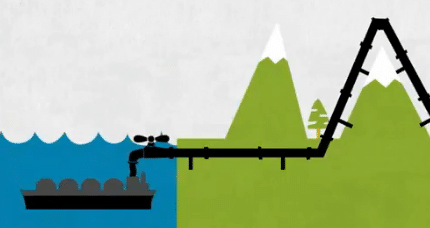The British Columbia government has plans to double or even triple the amount of natural gas produced in the province in order to meet growing international demand. Although the proposed Enbridge Northern Gateway pipeline is a key issue of concern to British Columbians, widespread fracking for unconventional gas presents another significant challenge that should be on the public’s radar, according to the Canadian Centre for Policy Alternatives (CCPA).
As the CCPA reports, BC‘s gas production targets all but ensure the province will fail to meet its own 2007 emission reductions targets as laid out in the Greenhouse Gas Reduction Targets Act. Exported gas from BC is expected to contribute the emissions equivalent of putting 24 million new cars on the road, and all for a 0.1 percent projected increase in provincial jobs.
You can watch this animated video here for an overview:
In a 2011 report the CCPA highlighted these outcomes of BC‘s fracking ambitions:
– A potential doubling of industry greenhouse gas emissions by 2020, as fracking activities escalate. If BC is to meet its legislated targets for greenhouse gas reduction, every other sector of the provincial economy will have to cut their emissions in half.
– The BC government giving shale gas companies access to public water supplies for 20 years, with little or no public consultation despite the massive amounts of water used (up to 600 Olympic swimming pools per gas well pad).
– Potential increases in shale gas piped to Alberta, where it already helps to fuel operations at the tar sands.
In response, CCPA advances these recommendations:
– A cap on annual shale gas production.
– An end to all government subsidies of the natural gas industry.
– A requirement that the province explain how BC will meet its legislatively mandated greenhouse gas emissions reduction targets while simultaneously supporting the shale gas industry.
– Increased water prices for industry, to encourage innovation and conservation (currently companies pay nothing for the water they use, or nominal charges of just $2.75 for each Olympic swimming pool of water).
– A requirement that the industry pay full cost for the electricity it uses.
Subscribe to our newsletter
Stay up to date with DeSmog news and alerts







